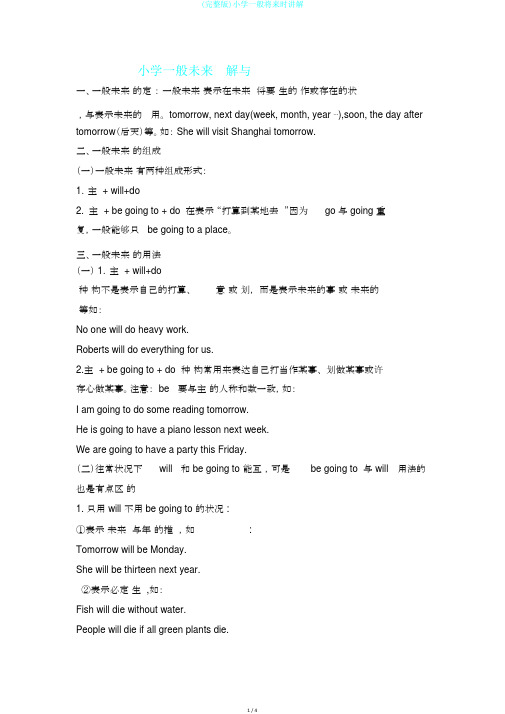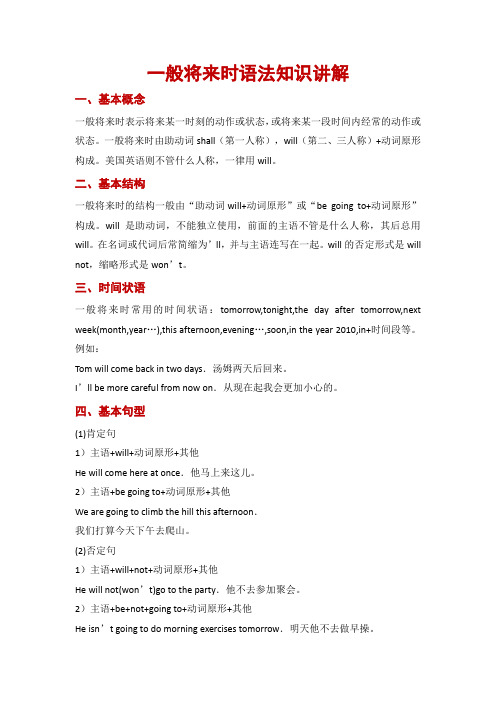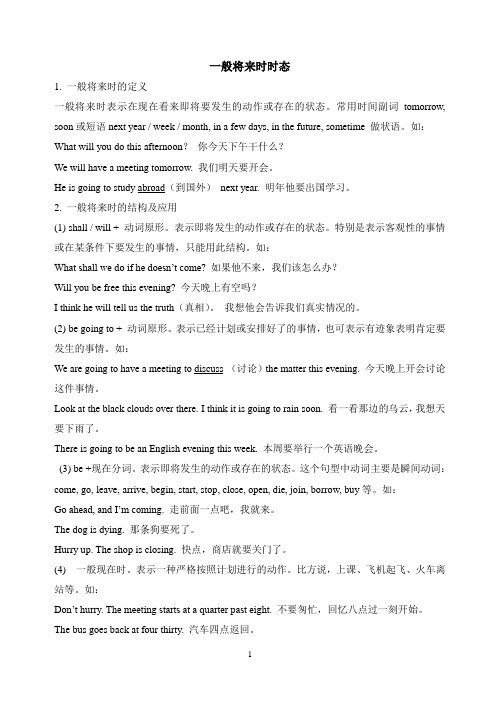小学一般将来时讲解
小学英语重点语法般将来时

小学英语重点语法:般将来时“一般将来时”的几种语法形式一般将来时的语法形式主要有四种:shall / will +动词原形;be going to +动词原形;现在进行时和一般现在时。
现将这四种形式分述如下:一、shall / will +动词原形1. will可用于所有人称,但shall 仅表示单纯将来时,用于第一人称I和we,作为will的一种替代形式。
以You and I为主语时通常避免用shall。
例如:He will be back soon. 他很快就会回来。
I shall/will be free on Sunday. 星期天我有空。
You and I will work in the same factory. 你和我将在同一工厂工作。
2. will, shall可用来预言将来发生的事。
如说出我们设想会发生的事,或者请对方预言将要发生什么事。
例如:It will rain tomorrow. 明天将要下雨。
3. will, shall除可表示单纯的将来时以外,还可以带有意愿的色彩,仍指的是将来。
例如:I’ll buy you a bicycle for y our birthday. 你过生日时,我给你买一辆自行车。
(表示允诺)Will you open the door for me please? 请你帮我开门好吗?(表示请求)Shall I get your coat for you? 我可以为你拿外套吗?(表示提议)二、be going to +动词原形1. 表示说话人根据现在已有的迹象,判断将要或即将发生某种情况。
这类句子的主语可以是人,也可是物。
例如:There is going to be a football match in our school tomorrow afternoon. 明天下午我们学校将有一场足球赛。
(已有告示)I feel terrible. I think I’m going to die. 我感到难受极了,我想我快不行了。
(完整版)小学一般将来时讲解

小学一般未来解与一、一般未来的定:一般未来表示在未来将要生的作或存在的状,与表示未来的用。
tomorrow, next day(week, month, year ⋯),soon, the day after tomorrow(后天)等。
如: She will visit Shanghai tomorrow.二、一般未来的组成(一)一般未来有两种组成形式:1.主 + will+do2.主 + be going to + do 在表示“打算到某地去”因为 go 与 going 重复,一般能够只 be going to a place。
三、一般未来的用法(一) 1.主 + will+do种构不是表示自己的打算、意或划,而是表示未来的事或未来的等如:No one will do heavy work.Roberts will do everything for us.2.主 + be going to + do 种构常用来表达自己打当作某事、划做某事或许存心做某事。
注意: be 要与主的人称和数一致,如:I am going to do some reading tomorrow.He is going to have a piano lesson next week.We are going to have a party this Friday.(二)往常状况下will和be going to能互,可是be going to 与 will用法的也是有点区的1. 只用 will 不用 be going to 的状况 :①表示未来与年的推,如:Tomorrow will be Monday.She will be thirteen next year.②表示必定生 ,如:Fish will die without water.People will die if all green plants die.2.只用 be going to 而不用 will 的状况:假如表示已有迹象表示在不久的未来要发生的事情时,如:Look at those black clouds, It’ s going to rain.(三)某些动词如: go/come/leave/start/begin/arrive等,它们的此刻进行时能够表示未来时,如:They are leaving for Shanghaitomorrow.My brother is coming here soon.四、一般未来时的句式变换一定句:主语 + will+do主语 + be going to + do否认句:主语 + will+not+do (will not可缩写成won’t)主语 + be+ not+ going to +do一般疑问句:will+ 主语 + dobe+主语 +going to+do特别疑问句:疑问词 + will+ 主语 +do疑问词 +be+主语 +going to+do五.稳固练习一、按要求填空1.我打算明日和朋友去野炊。
小学语法经典总结---一般将来时1

I feel terrible.I think I'm going to die.我感到难受极了,我想我快不行了。
Jack isn’t in.He has gone to the park.杰克布在家,他去超市了。
How long have you been in China?你在中国呆了多久了?
2. a lot of许多的,后面跟可数名词复数形式
3.take photos拍照take pictures
take photos of拍……的照片
He will write a book one day.将来他要写一本书。
(2)be going to表示主观判断将来肯定发生的事情,will表示客观上将势必发生的事情。
Look at those black clouds!It's going to rain.看看那些乌云!天快要下雨了
He will be twenty years old.他快二十岁了。
(3)be going to含有计划准备的意思,而will没有这个意思。
She is going to lend us her book.他准备把书借给我
He will be here in half an hour.他半小时后到。
用所给词的适当形式填空:
1、where are you going to ___________(go) next Mondy?
He will be back soon.他很快就会回来。
I shall/will be free on Sunday.星期天我有空。
一般将来时态讲解(共25张PPT)

• I don't think the test will be very difficult. 。
②用于“祈使句 + and + 陈述句” 中
I don’t think it will rain this afternoon.
I am hungry. I think I’ll have something to eat.
表示看法,观点
“There be”句型的一般将来时 肯定句: There will be +名词+其他成份 [注意]:无论后面加单数名词或复数形式,be都必须用原形。
shall适用于第一人称I,We;而will适用于所有人称。 通常可以用will来代替shall。 will,shall均可缩写为:'ll,如:
I will= I'll; she will = she’ll;will not 和shall not分别可以 缩写为 won't 和shan't。
1.一般将来时的用法
4. be about to + 动词原形。 表示 (1)“即将做”或“马上做”
(2)因此,句子不能再用时间状语。
Don’t leave. Li Lei is about to come. 不要走了,李蕾就要来了。 Be quiet. The concert is about to start. 安静下来,音乐演唱会就要开始了。
• My uncle will come to see me every Saturday.
• 我叔叔每个星期六都会来看我。
• The students will have five English classes per week this term.
小学一般将来时讲解

小学一般将来时讲解1. 介绍小学一般将来时是英语语法中的一种时态,用来表示将来发生的行动或事件。
在这种时态中,动作与时间的关系是相对的,即动作将在将来某一时刻发生。
2. 构成小学一般将来时由情态动词 "will" 或 "shall" 加上动词原形构成。
下面是一些例子:- I will go to school.- She will play basketball.- We shall see a movie.3. 肯定句结构小学一般将来时的肯定句结构是:主语 + will/shall + 动词原形+ 其他。
4. 否定句结构小学一般将来时的否定句结构是:主语 + will/shall + not + 动词原形 + 其他。
5. 疑问句结构小学一般将来时的疑问句结构是:Will/Shall + 主语 + 动词原形+ 其他?6. 使用场景小学一般将来时常用于以下场景:- 表示未来的计划或打算:I will go to the park tomorrow.- 表示预测:It will rain later.- 表示意愿或请求:Will you help me with my homework?7. 注意事项在小学一般将来时中,我们要注意以下几点:- 不使用"will"或"shall"来表达对他人的承诺或决定,如"I promise"或"I decide"。
- 在口语中,经常使用"will"而不是"shall"。
- 在第一人称疑问句中,我们可以使用"shall"代替"will",但这并不常见。
希望这份文档对你的小学一般将来时的学习有所帮助!。
一般将来时语法知识讲解

一般将来时语法知识讲解一、基本概念一般将来时表示将来某一时刻的动作或状态,或将来某一段时间内经常的动作或状态。
一般将来时由助动词shall(第一人称),will(第二、三人称)+动词原形构成。
美国英语则不管什么人称,一律用will。
二、基本结构一般将来时的结构一般由“助动词will+动词原形”或“be going to+动词原形”构成。
will是助动词,不能独立使用,前面的主语不管是什么人称,其后总用will。
在名词或代词后常简缩为’ll,并与主语连写在一起。
will的否定形式是will not,缩略形式是won’t。
三、时间状语一般将来时常用的时间状语:tomorrow,tonight,the day after tomorrow,next week(month,year…),this afternoon,evening…,soon,in the year 2010,in+时间段等。
例如:Tom will come back in two days.汤姆两天后回来。
I’ll be more careful from now on.从现在起我会更加小心的。
四、基本句型(1)肯定句1)主语+will+动词原形+其他He will come here at once.他马上来这儿。
2)主语+be going to+动词原形+其他We are going to climb the hill this afternoon.我们打算今天下午去爬山。
(2)否定句1)主语+will+not+动词原形+其他He will not(won’t)go to the party.他不去参加聚会。
2)主语+be+not+going to+动词原形+其他He isn’t going to do morning exercises tomorrow.明天他不去做早操。
(3)一般疑问句1)Will+主语+动词原形+其他?Will he help you with your English?他会帮助你学习英语吗?2)Be动词(Am,Is,Are)+主语+going to+动词原形+其他?Are you going to play computer games tomorrow afternoon?你打算明天下午玩电脑游戏吗?(4)特殊疑问句:疑问词+一般疑问句?—What will the students have for lunch today?学生们今天午饭吃什么?—They will have bread.他们将吃面包。
一般将来时讲解及练习六年级

一般将来时标志词:tomorrow,thedayaftertomorrow,nextweek,intwoyears,soon,threedayslater等结构一:willwill可用于所有人称,shall只用于第一人称I和we肯定形式:主+willdo一般疑问:will+主+do否定形式:主+won’tdo特殊疑问:what/when/where/which+will+主+doeg:1.we knowtheresultsoon.我们很快就会知道结果了;2.we knowtheresultsoon.我们不会很快就知道结果的;3. we knowtheresultsoon.我们将会很快就知道结果吗4. weknowtheresult.我们将在什么时候知道结果结构二:begoingto肯定形式:主+begoingto+do一般疑问:be+主+goingto+do否定形式:主+benotgoingto+do特殊疑问:what/when等+be+主+goingto+doeg:skyisfullofblackclouds.Itto .快要下雨了;2.ButIthinkit rain.但我觉得它不会下雨;3.it soon很快就会下雨了吗4. you to tomorrow明天你要干什么小小区别:通常情况下will和begoingto能互换will,shall多习惯用于表示是否愿意,第一人称作主语的疑问句一般用shall不用willbegoingto则多用于表示根据迹象判断将要发生某事,或者计划打算要做的事eg:1.youdrivetoschooltomorrowwemeetat8:00tomorrowattheblackcloudsIt rain.readsomebookinthelibrarythisafternoon.用现在进行时bedoing表示将来时:go,come,leave,arrive等表示位置转移的动词eg:1.UncleWang come.王叔叔就要来了;2.They leaveforBeijing.他们即将前往北京;一般将来时练习一.连词成句并按要求改变句式注意动词的正确形式1、children,at,study,home,will,on,computer,inthefuture肯定陈述句:一般疑问句:2、back,they,month,later,a,get,will肯定陈述句:否定句:一般疑问句:3、he,is,going,a,to,patty,evening,this肯定陈述句:否定句:一般疑问句:特殊疑问句问时间:4. China is a modern and strong country.in twenty years5. Do you study hardfrom now on二、用括号中词的适当形式填空1、Thebus come.Pleasewaitforaminute.2、Guangzhou 将会morebueatifulYes,3、Howyou spentyouwinterholiday4、Peoplehavelessworktodointhefuture.5、we goouttomorrowifit rain三、选择正确的答案1. Thereanimportantmeetingnextweek.A.willbeB.willhaveC.willhasD.willgoingtobe2. toEnglandtomorrow.A.flyB.flewC.isflyingD.flies3. Marywillcomebackfiveo’ter4. yougototheparktomorrowA.WillB.ShallC.DoD.Are5. . The day after tomorrow they ________ a volleyball match.A. will watchingB. watchesC. is watchingD. is going to watch6. .There ________ a birthday party this Sunday.A. shall beB. will beC. shall going to beD. will going to be7. They ________ an English evening next Sunday.A. are havingB. are going to haveC. will havingD. is going to have8. ________ you ________ free next Sunday A. Will; areB. Will; be C. Do; be D. Are; be9. He ________ there at ten tomorrow morning. A. willB. Is C. will beD. be10. ________ your brother ________ a magazine from the libraryA. Are; going to borrowB. Is; going to borrowC. Will; borrowsD. Are; going to borrows作业:一、单项选择;1. There __________ a meeting tomorrow afternoon.A. will be going toB. will going to beC. is going to beD. will go to be2. Charlie ________ here next month.A. isn’t workingB. doesn’t workingC. isn’t going to workingD. won’t work3. He ________ very busy this week, he ________ free next week.A. will be; isB. is; isC. will be; will beD. is; will be4. There ________ a dolphin show in the zoo tomorrow evening.A. wasB. is going to haveC. will haveD. is going to be5.–________ you ________ free tomorrow – No. I ________ free the day after tomorrow.A. Are; going to; willB. Are; going to be; willC. Are; going to; will beD. Are; going to be; will be6. Mother ________ me a nice present on my next birthday.A. will givesB. will giveC. givesD. give7. – Shall I buy a cup of tea for you–________. 不,不要;A. No, you won’t.B. No, you aren’. No, please don’t.D. No, please.8. – Where is the morning paper – I ________ if for you at once.A. getB. am gettingC. to getD. will get二、动词填空;1. I ______leavein a minute. I ______finishall my work before I ______ leave.2. —How long _____ you _____studyin our country—I _____planto be here for about one more year.—What ______ you ______doafter you ______leavehere—I ______returnhome and ______geta job.3. I ______betired. I ______goto bed early tonight.4. Mary’s birthday is next Monday, her mother _____giveher a present.三、句型转换;1. People in the north often go skating in winter. next winter2. There are two cinemas in that town. next year3. He comes back late.in two days4.She is a conductor of a train.soon。
(完整版)一般将来时时态用法讲解

一般将来时时态1. 一般将来时的定义一般将来时表示在现在看来即将要发生的动作或存在的状态。
常用时间副词tomorrow, soon或短语next year / week / month, in a few days, in the future, sometime 做状语。
如:What will you do this afternoon?你今天下午干什么?We will have a meeting tomorrow. 我们明天要开会。
He is going to study abroad(到国外)next year. 明年他要出国学习。
2. 一般将来时的结构及应用(1) shall / will + 动词原形。
表示即将发生的动作或存在的状态。
特别是表示客观性的事情或在某条件下要发生的事情,只能用此结构。
如:What shall we do if he doesn’t come? 如果他不来,我们该怎么办?Will you be free this evening? 今天晚上有空吗?I think he will tell us the truth(真相)。
我想他会告诉我们真实情况的。
(2) be going to + 动词原形。
表示已经计划或安排好了的事情,也可表示有迹象表明肯定要发生的事情。
如:We are going to have a meeting to discuss (讨论)the matter this evening. 今天晚上开会讨论这件事情。
Look at the black clouds over there. I think it is going to rain soon. 看一看那边的乌云,我想天要下雨了。
There is going to be an English evening this week. 本周要举行一个英语晚会。
(3) be +现在分词。
表示即将发生的动作或存在的状态。
- 1、下载文档前请自行甄别文档内容的完整性,平台不提供额外的编辑、内容补充、找答案等附加服务。
- 2、"仅部分预览"的文档,不可在线预览部分如存在完整性等问题,可反馈申请退款(可完整预览的文档不适用该条件!)。
- 3、如文档侵犯您的权益,请联系客服反馈,我们会尽快为您处理(人工客服工作时间:9:00-18:30)。
小学一般将来时讲解与练习
一、一般将来时的定义:一般将来时表示在将来时间将要发生的动作或存在的状态,与表示将来的时间连用。
tomorrow, next day(week, month, year…),soon, the day after tomorrow(后天)等。
如:She will visit Shanghai tomorrow.
二、一般将来时的构成
(一)一般将来时有两种构成形式:
1.主语+ will+do
2. 主语+ be going to + do 在表示“打算到某地去时”由于谓语动词go与going重复,一般可以只说be going to a place。
三、一般将来时的用法
(一)1.主语+ will+do
这种结构不是表示自己的打算、意图或计划,而是表示未来的事实或对将来的预测等如:
No one will do heavy work.
Roberts will do everything for us.
2.主语+ be going to + do这种结构常用来表达自己打算做某事、计划做某事或者有意做某事。
注意:be 动词要与主语的人称和数一致,如:
I am going to do some reading tomorrow.
He is going to have a piano lesson next week.
We are going to have a party this Friday.
(二)通常情况下will 和be going to能互换,但是be going to 与will 用法的也是有点区别的
1. 只用will不用be going to的情况:
①表示对未来时间与年龄的推测时,如:
Tomorrow will be Monday.
She will be thirteen next year.
②表示必然发生时,如:
Fish will die without water.
People will die if all green plants die.
2.只用be going to而不用will的情况:
如果表示已有迹象表明在不久的将来要发生的事情时,如:
Look at those black clouds, It’s going to rain.
(三)某些动词如:go/come/leave/start/begin/arrive等,它们的现在进行时可以表示将来时,如:
They are leaving for Shanghaitomorrow.
My brother is coming here soon.
四、一般将来时的句式变换
肯定句:主语+ will+do
主语+ be going to + do
否定句:主语+ will+not+do(will not 可缩写成won’t)
主语+ be+ not+ going to +do
一般疑问句:will+主语+ do
be+主语+going to+do
特殊疑问句:疑问词+ will+主语+do
疑问词+be+主语+going to+do
五.巩固练习
一、按要求填空
1. 我打算明天和朋友去野炊。
I_____ _______ _________ have a picnic with my friends.
I ________ have a picnic with my friends.
2. 下个星期一你打算去干嘛? 我想去打篮球。
What ________ ________ _________ _________ _________ next Monday?
I _______ ______ _____ play basketball. What _________ you do next Monday?
I ________ play basketball.
3. 你妈妈这个周末去购物吗?是,她要去买一些水果。
_____ your mother _______ ________ go shopping this ___________? Yes, she _________. She ______ ________ __________ buy some fruit.
4. 你们打算什么时候见面。
What time _______ you _________ __________ meet?
二、改句子。
5. Nancy is going to go camping.(改否定)
Nancy ________ going to go camping.
6. I’ll go and join them.(改否定)
I _______ go ______ join them.
7. I’m going to get up at 6:30 tomorrow.(改一般疑问句)
________ _______ ________ to get up at 6:30 tomorrow?
8. We will meet at the bus stop at 10:30.(改一般疑问句)
_______ ________ meet at the bus stop at 10:30.
9. She is going to listen to music after school.(对划线部分提问)
________ _______ she ________ ________ _________ after school?
10. My father and mother are going to see a play the day after tomorrow.(同上) _________ _________ going to see a play the day after tomorrow.
三、用所给词的适当形式填空。
11. Today is a sunny day. We ___________________ (have) a picnic this afternoon.
12. My brother _______________ (go) to Shanghai next week.
13. Tom often ______________(go) to school on foot. But today is rain. He ______________ (go) to school by bike.
14. What do you usually do at weekends? I usually ________ (watch) TV and ________(catch) insects?
15. It’s Friday today. What _____she _________ (do) this weekend? She ______________ (watch) TV and _____________ (catch) insects.
16. What ___________ (d0) you do last Sunday? I ____________ (pick) apples on a farm.
What ______________ (do) next Sunday? I ______________ (milk) cows.
17. Mary ____________ (visit) her grandparents tomorrow.
18. Liu Tao ____________ (fly) kites in the playground yesterday.
19. David ______________ (give) a puppet show next Monday.
20. I ________________ (plan) for my study now.。
